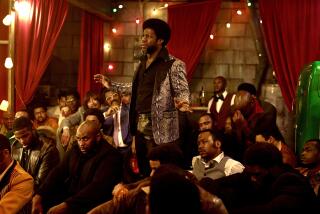Plan Lets ‘Dead’ Man Lose a Fight
On March 15, 1993, in the main event of a Jefferson City, Mo., boxing show, “King” Arthur Jimmerson knocked out Shane Mooney in the second round. Still, the fact that Mooney lasted as long as he did was noteworthy, considering he had died five months earlier.
In truth, heavyweight Mike Smith posed as Mooney -- who had been killed in an auto accident -- to get around a medical suspension. Smith was handled by a Midwest group that supplied boxers with phony names and Social Security numbers and, on occasion, fixed fights, according to investigative efforts in several states.
The enterprise known as the Indiana-Oklahoma connection allegedly was headed by matchmakers Sean Gibbons and Pete Susens, who are now among those being investigated by the FBI in a probe of the Las Vegas-based Top Rank boxing organization.
Gibbons and Susens went to work for Top Rank, one of boxing’s biggest promoters, within the last decade. Gibbons was fired in January after the FBI searched Top Rank’s offices.
The Oklahoma Department of Labor launched an investigation in response to allegations of irregularities by that state’s boxing administrator. Although the findings, released in 1997, were turned over to the FBI, the Social Security Administration and the Internal Revenue Service, no charges were ever filed.
Susens has denied any wrongdoing and Gibbons, through his attorney, had no comment.
“I’ve got no problems,” Susens said when contacted last week. “I’ve got nothing to hide.”
Gibbons told the Sunday Oklahoman in 1997: “The report was pure fiction. I mean, the only thing missing from the report was that I was on the grassy knoll in Dallas.”
Authorities said the current FBI probe closely mirrors the 1997 Oklahoma investigation.
In one case, two fighters faced each other 14 times, one of them using three different names, said Jacob Hall, chairman of the Indiana Boxing Commission, who started investigating the Indiana-Oklahoma group in 1993.
In another instance, a fighter’s opponent turned out to be his brother, using an alias, Hall said.
False names allow fighters to skirt state rules on how often they can fight, and, in the process, allow poor boxers to compile impressive records. In some cases, this can lead to lucrative appearances against major opponents.
In an interview last week, Hall said he reported his findings to the office of U.S. Atty. Gen. Janet Reno and FBI offices in Indiana and Oklahoma in 1997 but never heard back from any of them. He said he had not talked to anyone from law enforcement in connection with the current federal investigation.
The Indiana-Oklahoma group’s fighters competed mainly in small clubs or in preliminary matches on major fight cards, before the televised bouts occurred and most of the spectators were seated.
The connection was formed in Indianapolis, where Fred Berns, a small-time fight promoter, took in young men who wanted to learn the boxing business. In lieu of pay, he said, he gave them free housing and, in some cases, a percentage of the revenue they brought in by working on his boxing shows. Berns said that if any of them were breaking the law, he was unaware of it.
Susens arrived in 1979 at age 22, hitchhiking from Minnesota to see a Golden Gloves tournament, Berns recalled during a telephone interview. “I got a call from a guy he worked with who said Susens was literally living in a coal bin. The guy wanted to know if I could make sure Pete didn’t freeze to death. He showed up with a knapsack in which he kept his files, boxers’ records on 3-by-5 cards.”
Gibbons came from Oklahoma in 1989, joining with Susens to create the operation that became known to promoters throughout the Midwest and Great Plains.
Gibbons would pack Oklahoma fighters into his car and they would travel from state to state, operating under his instructions. “Sean [Gibbons] would say, ‘They are not gonna pay you if you win.... So I had to lose,” Smith, who fought as the deceased Mooney, told an Oklahoma investigator.
Smith took Mooney’s name to get around a mandatory 30-day medical suspension imposed after Randall “Tex” Cobb had knocked Smith out two weeks earlier.
Smith, who is in an Oklahoma prison on a drug-related conviction, told an investigator that he did not know he was fighting under a dead man’s name.
“Basically, Sean [Gibbons], they will call me and ask me, do I want to fight? They’d say certain amount of money and I go fight,” Smith said in the 1997 report. “It wasn’t that he would tell me that I would fight under this name or that name.”
Smith said he would hear his alias for the first time when he was introduced in the ring.
The Indiana-Oklahoma fighters sometimes used several aliases, according to investigators.
A welterweight named Verdell Smith, for example, also fought as Tim Brooks and Tommy Bowles, according to Hall, the Indiana Boxing Commission chairman, and BoxRec.com, a respected source of fight records.
“He is Verdell Smith when he fights in Oklahoma, Tim Brooks in Indiana and Tommy Bowles in Missouri,” Hall said.
Verdell Smith’s attorney, Michael Marley, confirmed that Smith had fought under different names.
“There is no question about that. If anybody’s got any criminal charges in regard to that, bring it on,” Marley said in a telephone interview. “ ... Verdell has committed no crime in any of the 50 states and no federal crime in the ring, out of the ring or under the ring.”
Hall said the deception went beyond the use of aliases.
“When you looked at the tapes, as I did, you could see some of the fights, including some involving Verdell Smith, were orchestrated, in my opinion,” Hall said. “If you ran the tapes back in slow motion, you could see a guy’s head going backward before the punch was even thrown.”
Marley denied that Smith had ever thrown a fight.
“I don’t care if Verdell used the name Mickey Mouse, he has always done his best,” the attorney said. “Every fight he lost, he lost on merit, meaning he didn’t have the ability to beat the other fighter.... Is Verdell a great fighter? No. Is he a tomato can? I suppose so, but he is a reliable opponent.”
Hall said he grew suspicious of the Indiana-Oklahoma fighters when he noticed that all of their applications appeared to have been written in the same handwriting, many of them listing their residence as the same Oklahoma address.
Hall said Indiana law enforcement officials were powerless to take action against the Indiana-Oklahoma connection because its fighters stopped applying for licenses in his state when he began to question their operation.
Sen. John McCain (R-Ariz.) and others have called for legislation authorizing the appointment of a national boxing czar with powers akin to the baseball commissioner.
Susens saw no need for regulation, Hall said, recounting an informal conversation with the matchmaker.
“Pete told me, ‘You don’t have to know their names, just so long as the crowd thinks it’s a good fight,’ ” Hall said. “He thought fighters should be able to go from city to city like a circus and that we didn’t need to know their real names. And he didn’t think the government should be involved in boxing.”
Times staff writer Greg Krikorian contributed to this report.
More to Read
Go beyond the scoreboard
Get the latest on L.A.'s teams in the daily Sports Report newsletter.
You may occasionally receive promotional content from the Los Angeles Times.










